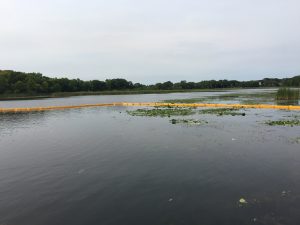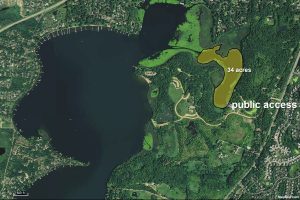 From the Minnehaha Creek Watershed District
From the Minnehaha Creek Watershed District
Wednesday, August 24, 2016
The Minnehaha Creek Watershed District (MCWD) has discovered zebra mussels at the public boat access to Lake Minnewashta in Chanhassen. While official confirmation from the Minnesota Department of Natural Resources (DNR) is pending, the MCWD and Carver County are working with the DNR to plan a rapid response in the hopes of preventing their spread lake-wide.
MCWD’s aggressive early detection monitoring led to the discovery. During a regular site visit on Thursday, August 18, MCWD staff found four zebra mussels on rocks in shallow water under one dock at the public boat access. Ten more were found in the same vicinity during a lake-wide search the following day. No additional zebra mussels were found outside of the public access. The zebra mussels were between two and 12 millimeters in size, indicating they were likely not reproducing. Water samples were taken to determine whether zebra mussel larvae (veligers) are present. Those test results are pending.
MCWD staff and Carver County are working with the DNR to plan a vigorous and effective course of action. MCWD’s and Carver County’s aquatic invasive species (AIS) programs have set aside funds for AIS rapid response. A barrier has been placed around the public boat access in an effort to contain the infestation. A second barrier was placed at the channel that connects the bay where the public boat access is located to the rest of the lake. Boats are being redirected by signage to the former boat launch area #2, approximately ¼ mile further into the park, until further notice.
Treatment options are being considered. The low number of zebra mussels detected, their young age and their location improve the chances for success. The approximately 30-acre bay where the public boat access is located is connected to Lake Minnewashta by a small channel that lacks the conditions conducive to zebra mussel survival. Due to these factors and the early detection, it may be possible to eliminate the zebra mussels from the site and prevent their spread throughout the lake.
MCWD conducts regular monitoring of Lake Minnewashta, which is considered at high risk for zebra mussels due to its proximity to Lake Minnetonka, where zebra mussels have been present since 2010. Weekly early detection checks at the public access include examining the zebra mussel sampler and checking rocks and other hard surfaces. MCWD staff also conduct a snorkeling survey at the public access and have equipped citizen volunteers with zebra mussel samplers that they monitor throughout the lake.
More information will be provided as it becomes available. Learn more at www.minnehahacreek.org/ais.



